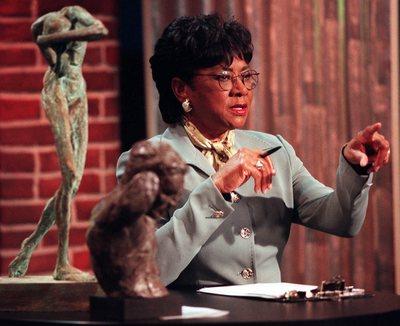
Belva Davis, the trailblazing journalist who broke the color barrier and graced Bay Area airwaves and television sets for more than five decades, died Wednesday at the age of 92.
Related Articles
KION shuts down news department after 56 years
FBI arrests man accused of shooting at Northern California ABC news station
Trump’s moves against the media mirror approaches by authoritarian leaders to silence dissent
What’s up with boys? A discussion with Jim Steyer of Common Sense Media
What to know about Brendan Carr, the head of the Federal Communications Commission
After initially starting her career in print, Davis transitioned into radio and broadcast journalism in the Bay Area in the mid-1960s, becoming the first Black female TV reporter on the West Coast when KPIX-TV hired her in 1966. However, for those who knew her best, her impact extended beyond the journalism world.
“While many news outlets will report on her being a pioneer in journalism and a civil rights advocate, as well as her groundbreaking career in television broadcasting, to us she was just mom and ‘Nana,’” the Davis family said in a statement. “Mom had an uncanny knack for asking questions that allowed different points of view to drive civil discourse. We will miss the spirited dinner conversations. She taught us all about standing up for social equity and that silence was complicity.”
Born in northern Louisiana, Davis moved to Oakland as a child and graduated from Berkeley High School. Although Davis was accepted into San Francisco State University, she could not afford to go to college at the time. The initial seeds of her career began in the late 1950s, when she started freelancing for Jet Magazine and later wrote for the Sun Reporter and Bay Area Independent.
Davis was later hired at Bay Area radio stations KSAN and KDIA, which allowed her to attend the 1964 Republican National Convention at the Cow Palace in Daly City — an event which emboldened her desires to become a reporter.
In her memoir, “Never in My Wildest Dreams: A Black Woman’s Life in Journalism,” Davis recounted the horrendous racial abuse she and her colleagues endured as a mob harassed them.
Along with working at KPIX-TV, where she rose to anchor, Davis appeared on KRON-TV and joined KQED in 1977, where she would later host “This Week in Northern California” and remain until her retirement in 2012.
Among the biggest stories she covered were the Jonestown mass deaths, the assassinations of Mayor George Moscone and Supervisor Harvey Milk and the AIDS crisis.
Davis’ accolades include winning eight regional Emmy Awards and lifetime achievement recognition from both the National Association of Black Journalists and American Women in Radio and Television.
“Her voice was one of clarity, courage and conviction,” SAG-AFTRA Northern California president Robert Chestnut said in a statement. “As the first Black woman to anchor television news in the Western United States, Belva Davis redefined what was possible — not just for journalists of color, but for all who believe in the transformative power of public media. Her decades of service at KPIX, KRON, KQED and across the broadcasting landscape helped shape the civic and cultural fabric of Northern California.”
Along with journalistic talents, Davis was known for her saying, “Don’t be afraid of the space between your dreams and reality; if you can dream it, you can make it so,” and for influencing so many people’s lives that she entered.
“More than her groundbreaking journalism, Belva Davis was a mentor, a hero, and an inspiration to generations of women of color in journalism,” Society of Professional Journalists Northern California board member Meaghan Mitchell said in a statement. “She opened doors, lifted others up and demonstrated that integrity, perseverance, and excellence could overcome even the steepest obstacles.”
In a CBS Sunday Morning segment two years ago, correspondent Bill Whitaker said, “Knowing Belva Davis changed my life.”
Davis’ death has also resulted in an outpouring of tributes from her colleagues.
“A mentor in person during our days together at KPIX and by example for the rest of her life, she shaped my career and countless others,” former KPIX reporter and anchor Ron Magers wrote in an online post. “My appreciation, gratitude and love have no bounds.”
Davis is survived by her husband, Bill Moore; two children, Darolyn and Steven; and her granddaughters, Dava and Sterling.
“Belva was special in more ways than we can express, as a wife, a mom, a grandmother, a mentor, a friend and confidant,” the Davis family said. “We will miss her dearly and know that you will too.”